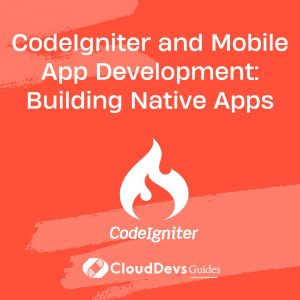Elevate Web Development: CodeIgniter & Blockchain in Perfect Harmony
In the world of web development, CodeIgniter has long been revered as a robust, open-source PHP framework that makes life easier for developers. It provides them with a toolkit to create full-featured web applications with speed and scalability. On the other side of the tech spectrum, blockchain technology has been making waves as a groundbreaking system that provides secure, transparent, and decentralized transactions.
At first glance, CodeIgniter and blockchain might seem unrelated. However, when these two technologies are combined, they can pave the way for innovative decentralized applications (DApps). Let’s explore how developers can integrate blockchain with CodeIgniter-based applications and some practical examples to get started.
1. Understanding the Basics
CodeIgniter: A PHP-driven framework, CodeIgniter offers a lightweight way to build web applications. With its Model-View-Controller (MVC) architecture, it aids developers in maintaining separation between data handling and user interface rendering.
Blockchain: At its core, blockchain is a chain of blocks, each containing transactional data. Due to its cryptographic nature and decentralized consensus mechanisms, it offers immutability, transparency, and security. DApps are applications that run on a blockchain, providing the benefits of this technology to users.
2. Integrating Blockchain with CodeIgniter
Integration of blockchain into a CodeIgniter application involves:
- Selecting a blockchain platform: Ethereum, for instance, is a popular choice for DApps due to its built-in smart contract functionality.
- Using a PHP library or API: Tools like “Web3.php” allow PHP applications to communicate with the Ethereum blockchain.
- Designing a User Interface (UI): Incorporate blockchain-related functionalities like showing transaction status or balance.
3. Examples of Decentralized Applications with CodeIgniter and Blockchain
2.1. Decentralized Identity Verification
Imagine a CodeIgniter web application where users typically log in using usernames and passwords. Integrating blockchain can allow users to have decentralized identities.
Steps:
– Use the Ethereum blockchain for storing users’ encrypted identities.
– During registration, a user’s unique identification information is encrypted and stored as a transaction on the blockchain.
– For login, the user provides their identification, which the CodeIgniter application then verifies against the blockchain data.
Benefits:
– Enhanced security against identity theft.
– Reduces the need for centralized databases vulnerable to hacking.
2.2. Decentralized Voting System
For organizations that use CodeIgniter applications for member interactions, a voting system can be enhanced with blockchain.
Steps:
– Create a smart contract on Ethereum that outlines the voting rules.
– Integrate the CodeIgniter application with the blockchain using Web3.php.
– Members cast votes through the application. Each vote is a transaction stored on the blockchain.
Benefits:
– Ensures transparency since all votes are recorded publicly.
– Prevents vote manipulation due to the immutable nature of blockchain.
2.3. Content Licensing Platform
Artists and creators can use a CodeIgniter-based platform to license their content and receive payments.
Steps:
– Content details and licensing terms are stored in a smart contract on the blockchain.
– Users can purchase licenses through the application.
– Payments are made using cryptocurrency, and transactions are recorded on the blockchain.
Benefits:
– Transparent record of all content licenses.
– Direct and secure payments to artists without intermediaries.
4. Challenges and Considerations
While combining CodeIgniter and blockchain presents exciting opportunities, there are challenges:
– Scalability: Blockchains, especially public ones like Ethereum, can face scalability issues.
– Cost: Every transaction on some blockchains incurs a fee, which can be a consideration for applications with a high volume of transactions.
– Learning curve: Developers might need to learn new languages (like Solidity for Ethereum) and familiarize themselves with blockchain principles.
Conclusion
The fusion of CodeIgniter and blockchain offers a promising avenue for developers to craft decentralized applications that harness the strengths of both technologies. Whether it’s ensuring transparent voting, safeguarding identities, or empowering artists, the potential is vast. However, as with all technological endeavors, it’s crucial to weigh the advantages against the challenges and to continuously evolve with the ever-changing landscape of web development and decentralized technologies.
Table of Contents









